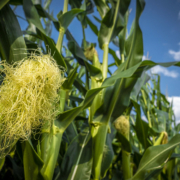Long-term Diversified Cropping Systems Study Finds No Carbon Sequestration Benefit
A 20-year study on diversified cropping systems fertilized with livestock manure, led by Iowa State University researchers, showed environmental benefits but not the expected carbon sequestration. The study results were published in Nature Sustainability. The long-term field study at Iowa State’s Marsden Farm contrasts a traditional two-year corn-soybean rotation with three- and four-year systems that include alfalfa, clover, or oats and replace most of the synthetic nitrogen fertilizer for corn with cattle manure. Scientists found that the additional carbon added in the diverse rotations stimulated microbial activity and decomposition that increased carbon loss, resulting in no change in carbon levels in the fields over the course of the study. However, scientists noted that the diversified rotations still had a positive climate impact because they produced more nitrogen for crops, supplanting synthetic fertilizer. This reduced nitrous oxide emissions from the diversified-rotation fields by a carbon dioxide equivalent of 60% to 70%.

 USDA/FPAC Photo by Preston Keres
USDA/FPAC Photo by Preston Keres
 Michigan State University
Michigan State University